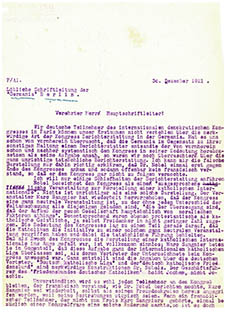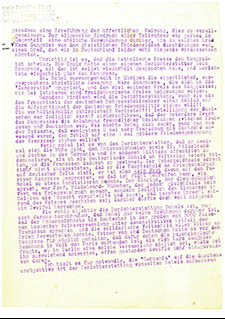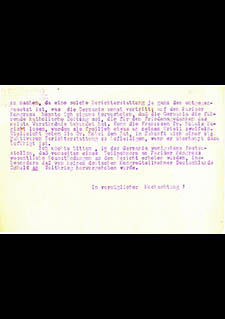Peace Activist
After the war’s end, Metzger resumed his lecturing for peace and international reconciliation and sought the collaboration all Catholic pacifists in Europe. At Christmas of 1919, Metzger and sixteen other men from eight countries published an appeal in support of the “World Peace League of the White Cross”. In keeping with the words of Benedict XV, they called for armed violence to be overcome by law and by establishing this idea internationally (Völkerbund und katholische Internationale, 42–44).
In Germany, Metzger had published an appeal for a “Peace League of German Catholics” together with clergy committed to peace and the journalist Josef Kral (1887–1965) in February of 1919. Afterward, he saw to it that the League, which rigorously rejected compulsory military service and violent resolution of international conflicts and called for the mediation of international conflicts by a League of Nations, was consolidated organizationally.
From 1920 onward, Metzger attended international conferences, such as the interdenominational “Democratic Congresses” held by the French Catholic Marc Sangnier (1873–1950). This forum consulted on a European peace in December of 1921. Metzger’s address on “Democracy, Peace Movement and Catholic International”was simultaneously the first lecture delivered by a German in Paris since the war’s end.
Metzger was elected to the fifteen-member “Comité de l’Internationale démocratique”. However, his involvement met with sharp criticism in the press sympathetic to the Center Party. Other travels led him to, among other places, London where he pointed out the Great Powers’ blame for the World War and criticized the Treaty of Versailles at a peace day, and to Esperanto congresses.
Metzger was now critical of the League of Nations he had initially favored. The organization in Geneva had too few positive achievements in issues of disarmament and nationhood or the social question. Instead of being a government body, the League of Nations must live up to its name and pursue another policy: away from palliative policy to dealing with the roots of international evil. Christians, too, are actively involved far too little (The League of Nations, 14).
Metzger based his criticism of the League of Nations’ orientation toward capitalism on Communist opinions as well. On the other hand, he kept his distance from the Center Party since he felt that its domestic and foreign policy did not serve the majority of the population.
Source / title
- © Archiv des Christkönigs-Instituts, Meitingen



